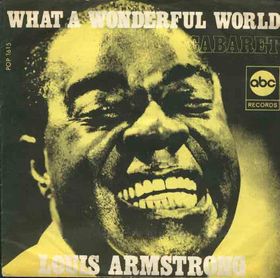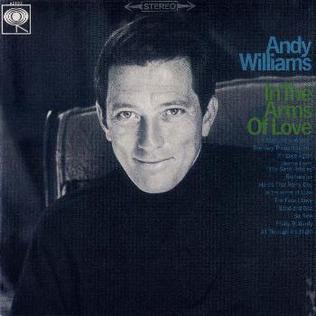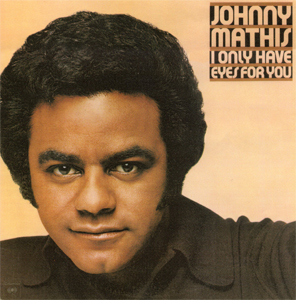
"What a Wonderful World" is a song written by Bob Thiele and George David Weiss. It was first recorded by Louis Armstrong and released in 1967 as a single. In April 1968, it topped the pop chart in the United Kingdom, but performed poorly in the United States because Larry Newton, the president of ABC Records, disliked the song and refused to promote it.
"Lullaby of Broadway" is a popular song with music written by Harry Warren and lyrics by Al Dubin, published in 1935. The lyrics salute the nightlife of Broadway and its denizens, who "don't sleep tight until the dawn."

"Ooo Baby Baby" is a song written by Smokey Robinson and Pete Moore. It is a classic 1965 hit single by The Miracles for the Tamla (Motown) label. The song has inspired numerous other cover versions by other artists over the years, including covers by Ella Fitzgerald, Todd Rundgren, The Escorts, The Five Stairsteps, Linda Ronstadt, and many others. The Miracles' original version of "Ooo Baby Baby" is listed as number 266 on Rolling Stone Magazine's list of "The 500 Greatest Songs of All Time".

"(If Loving You Is Wrong) I Don't Want to Be Right" is a song written by Stax Records songwriters Homer Banks, Carl Hampton, and Raymond Jackson. Originally written for The Emotions, it has been performed by many singers, most notably by Luther Ingram, whose original recording topped the R&B chart for four weeks and rose to number 3 on the Billboard Hot 100 in 1972. Billboard ranked it as the No. 16 song for 1972.

The Gibson Brothers are a French musical group, originally from Martinique, who had their greatest success during the disco boom of the late 1970s. Their best known hit singles included "Cuba" and "Que Sera Mi Vida".
"Zip-a-Dee-Doo-Dah" is a song composed by Allie Wrubel with lyrics by Ray Gilbert for the Disney 1946 live action and animated movie Song of the South, sung by James Baskett. For "Zip-a-Dee-Doo-Dah", the film won the Academy Award for Best Original Song and was the second Disney song to win this award, after "When You Wish upon a Star" from Pinocchio (1940). In 2004, it finished at number 47 in AFI's 100 Years...100 Songs, a survey of top tunes in American cinema.

"What a Fool Believes" is a song written by Michael McDonald and Kenny Loggins. The best-known version was recorded by the Doobie Brothers for their 1978 album Minute by Minute. Debuting at number 73 on January 20, 1979, the single reached number one on the Billboard Hot 100 on April 14, 1979, for one week. The song received Grammy Awards in 1980 for both Song of the Year and Record of the Year.
"Sweet Dreams" or "Sweet Dreams (of You)" is a country ballad, which was written by Don Gibson. Gibson originally recorded the song in 1955; his version hit the top ten of Billboard's country chart, but was eclipsed by the success of a competing version by Faron Young. In 1960, after Gibson had established himself as a country music superstar, he released a new version as a single. This version also charted in the top ten on the country chart and also crossed over to the Billboard Hot 100, where it peaked at number ninety-three. The song has become a country standard, with other notable versions by Patsy Cline and Emmylou Harris.

"Oh Lonesome Me" is a popular song written and recorded in December 1957 by Don Gibson with Chet Atkins producing it for RCA Victor in Nashville. Released in 1958, the song topped the country chart for eight non-consecutive weeks. On what became the Billboard Hot 100, it peaked at No. 7. It was Gibson's only Top 10 hit on the pop chart. Its B-side was "I Can't Stop Loving You", which peaked at No. 7 on the C&W Jockey charts and became a standard song about unrequited love. The vocal backings on both songs were provided by the Jordanaires.
"What a Little Moonlight Can Do" is a popular song written by Harry M. Woods in 1934. In 1934, Woods moved to London for three years where he worked for the British film studio Gaumont British, contributing material to several films, one of which was Road House (1934). The song was sung in the film by Violet Lorraine and included an introductory verse, not heard in the version later recorded by Billie Holiday in 1935.
"Silver Threads and Golden Needles" is a country song written by Dick Reynolds and Jack Rhodes. It was first recorded by Wanda Jackson in 1956. The original lyrics, as performed by Jackson, contain a verse not usually included in later versions, which also often differed in other minor details.
"And I Love You So" is a popular song written by folk singer and guitarist Don McLean and released on his 1970 debut album, Tapestry. Its chorus features an unusual rhyming scheme for a popular song: ABBA versus the usual AB(C or A)B.

"Never Leave You " is a song by American recording artist Lumidee, released as her debut single on May 12, 2003, from her first album, Almost Famous (2003). The official remix features Busta Rhymes and Fabolous. "Never Leave You " peaked at number three on the Billboard Hot 100. Outside of the United States, "Never Leave You " topped the charts in Belgium (Flanders), Germany, Italy, the Netherlands, and Switzerland, and peaked within the top ten of the charts in many other countries, including Austria, Belgium (Wallonia), Denmark, and the United Kingdom.
"Cabaret" is the title song of the 1966 musical of the same name, sung by the character Sally Bowles. It was composed by John Kander, with lyrics by Fred Ebb.

"What You Won't Do for Love" is a song by American singer-songwriter Bobby Caldwell. It was released in September 1978 as the lead single from his eponymous debut album. It was written by Caldwell and Alfons Kettner, and produced by Ann Holloway. The song has been covered and sampled numerous times, including by Tupac Shakur in the posthumous 1998 hit "Do for Love".

In the Arms of Love is the nineteenth studio album by American pop singer Andy Williams and was released on December 19, 1966, by Columbia Records and was the last of twelve consecutive Williams studio LPs produced by Robert Mersey.

"Sea of Heartbreak" is a song written by Paul Hampton and Hal David and recorded by Don Gibson in 1961. The song reached #2 on the Billboard Hot Country Singles & Tracks chart.

"Minute by Minute" is a song written by Michael McDonald and Lester Abrams originally released by The Doobie Brothers on their 1978 album Minute by Minute. The single was released in April 1979, debuted at number 67 on 5 May 1979, and reached number 14 on 23–30 June 1979 on the Billboard Hot 100 chart. It was nominated for a Grammy Award for Song of the Year, but lost out to The Doobie Brothers' own "What a Fool Believes". "Minute by Minute" did win a Grammy for Best Pop Vocal Performance By A Duo, Group Or Chorus at the 22nd Annual Grammy Awards.

I Only Have Eyes for You is an album by American pop singer Johnny Mathis that was released on May 10, 1976, by Columbia Records and included two new songs, "Yellow Roses on Her Gown" and "Ooh What We Do", which was written specifically for him, as well as a contemporary arrangement of the 1934 title track that foreshadowed his recordings of standards that incorporated a disco beat a few years later.

"Cuba" is a 1978 song by French musical group Gibson Brothers, released as the first single from their fourth album of the same name (1979). It was the group's first charting single: In the US, "Cuba", went to #81 on the US Billboard Hot 100, and #9 on the Billboard Dance chart. Outside the US, upon its original release, it reached number one in Finland, and was a top 30 hit in Belgium, the Netherlands and West Germany. It also peaked at number 41 in the UK, however, following the success of their follow-up top 10 hit songs "Ooh, What a Life" and "Que Sera Mi Vida ", it was re-released in 1980 as a double A side single with album track "Better Do It Salsa", reaching number 12 in the UK. However, its chart performance did not improve in the US due in large part to the anti Disco Backlash in the States at the time.













